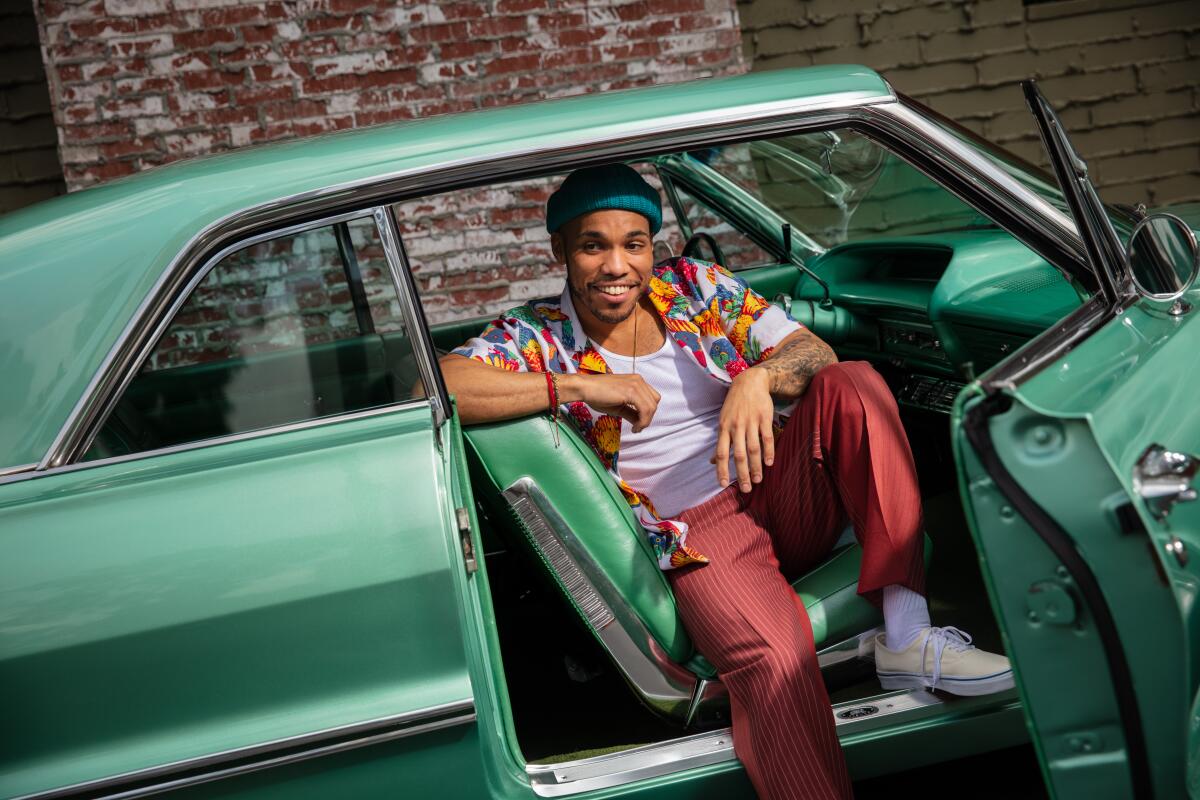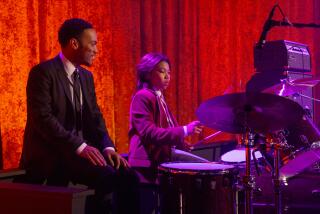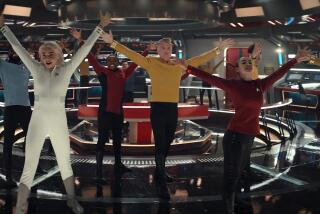How Anderson .Paak found his ‘Shang-Chi’ song at 4 in the morning

- Share via
Inspiration can come at the most unexpected times. For night owl and four-time Grammy winner Brandon Paak Anderson
(who performs as Anderson .Paak), those peak creative moments can occur between 3 and 9 a.m. It’s no surprise then, that his original song Oscar contender, “Fire in the Sky,” from “Shang-Chi and the Legend of the Ten Rings,” came together in the wee hours.
“We went in the studio, and ‘Fire in the Sky’ was a song that we pretty much came up with, like, at 4 in the morning,” Anderson says. “Right before we were leaving, we were kind of delirious, and we started making one more song, and that’s what became ‘Fire in the Sky.’ It’s completely different.”
Anderson, who says there are probably 50 versions of the song, originally wrote the track without seeing the film. He’d spoken to his friend and one of the film’s stars, Awkwafina, and its director, Destin Daniel Cretton, for initial inspiration, but screening an early cut helped him focus on what turned out to be the movie’s upbeat and soulful closer. He was also able to hear the demo in context as it plays during a key moment at the end of the film, when Shang-Chi (Simu Liu) and Katy (Awkwafina) are interrupted by Dr. Strange’s worried colleague, Wong (Benedict Wong).
“A lot of times when people like a tune before it’s done, it’s easy to mess it up. You start over-producing or changing it right away,” Anderson notes. “So we got together, and [Cretton] played us the rough edit, and I got to see them walking through the portal and the whole thing. And we had these sound effects that were already in there, like these kind of psychedelic sounds and stuff. And I had no clue that it would match so perfectly with them walking through the portal, and then the beat drops.”
And, of course, there was also the issue that Cretton fell in love with what turned out to be a very unfinished demo.
“I mean, it had a few things in there that stayed, but some of the lines, I wasn’t even speaking English. It was just gibberish,” Anderson sheepishly notes. “And he was like, ‘This is it!’ And I was like, ‘I need to put words here.’ You know? And so that was just making sure we kept the essence of it without changing too much. God bless him. I sent him so many different versions, because I kept finding different things wrong, had to fix certain things, and he just went all the way to the wire with us.”
When he got additional feedback from Bruno Mars, his Silk Sonic collaborator and co-songwriter on the track, another round of tweaks began. “I started fine-tuning it. Then I played it for Bruno, and then I had a whole new list of problems that I had to solve, because Bruno was like, ‘It’s great, but it needs this. It needs that.’ And he came in there like the mathematician he is and pointed out a few things that needed to be changing.”
Busy working on Silk Sonic’s debut album “An Evening With Silk Sonic” during this period, Anderson acknowledged that time wasn’t always on his side.
“I didn’t even know if the song was going to make it,” Anderson says. But the production team loved it and was eager to include it. “It was still in the demo phase. I went back, and we started chipping away at it, doing different things that needed to be done.”
He adds, “I mean, there’s certain songs, they kind of have, like, booby traps, and you have to just line them all up and figure it out. And this one had a lot of them from inception to the end.”
This project meant something special to the Oxnard, Calif., native. Especially after other soundtrack experiences where he felt there was no cohesion or a “real vibe.” The fact that his young son Soul Rasheed, who is heard at the end of the record, was part of the team, along with colleagues Dumbfoundead and Rogét Chahayed, also made it memorable.
“To be able to work with them on it and be able to work with Roget for the first time” means something, Anderson says. “He’s been a part of some big records, but we tell each other this is one of our favorite records that I’ve ever done. And to have it be our first record and have it be a part of this movie … it meant a lot.”
More to Read
From the Oscars to the Emmys.
Get the Envelope newsletter for exclusive awards season coverage, behind-the-scenes stories from the Envelope podcast and columnist Glenn Whipp’s must-read analysis.
You may occasionally receive promotional content from the Los Angeles Times.








